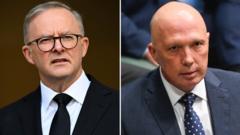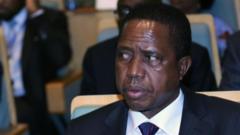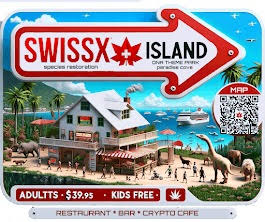As Australia gears up for its federal election on May 3, the political landscape is heating up with Prime Minister Anthony Albanese facing a strong challenge from Liberal Party leader Peter Dutton. Albanese, leading a minority Labor government, announced the election date from Parliament House, indicating a potentially razor-thin margin anticipated in the upcoming vote.
Australia's Federal Election Set for 3 May: A Battle for the Future

Australia's Federal Election Set for 3 May: A Battle for the Future
Australia prepares for a significant federal election slated for May 3, featuring tight competition between Prime Minister Anthony Albanese's Labor Party and Peter Dutton's Liberal Party.
With opinion polls suggesting a closely contested race, both parties might need to engage with independent lawmakers or minor parties, which saw a notable surge in voter support during the last election. Cost-of-living challenges are expected to take center stage in the campaign. Albanese, seeking to maintain his position as the first Labor leader to avoid a single-term setback since 1925, emphasized his commitment to improving free healthcare access, reducing student debt, and implementing small tax reductions. He portrayed Dutton's agenda as regressive, stating, "It was always going to take more than three years to clean up 10 years of mess," referencing the previous coalition government's legacy.
Dutton, on the other hand, criticized the current administration as detrimental to Australia's welfare, insisting that voters should question whether the nation is indeed better off than three years prior. His proposed solutions focus on cutting down government spending, reducing immigration, and lowering fuel and energy costs. Meanwhile, the Greens party, which captured a larger share of votes last time, urged electors to choose them to hold Labor accountable on significant environmental and housing issues.
Voter concerns are sharply focused on affordability issues, including housing and groceries, while access to healthcare remains a key talking point. Public worries about managing immigration and crime rates have also surged. Climate initiatives, a pivotal aspect of the previous election, continue to hold importance for many citizens.
Under Australia's compulsory voting system, both major parties face an uphill battle; achieving a majority requires winning at least 76 out of the 150 House of Representatives seats. Political stability has been a recent challenge, with the country experiencing leadership changes six times in just eight years before Albanese assumed office, vowing to promote unity and transparency.
Despite receiving praise for establishing ambitious emissions reduction targets and a carbon cap mechanism for major polluters, Albanese has faced setbacks. His goals for constitutional recognition of Aboriginal and Torres Strait Islander peoples fell short in a recent referendum, and rising global economic pressures have contributed to the cost-of-living crisis in Australia.
Dutton, who has served in Parliament for over two decades, has built a reputation as a staunch conservative. He previously faced scrutiny for his hardline stances on sensitive issues like immigration and marriage equality. As the election approaches, the question remains: which direction will Australians choose for their future?
Dutton, on the other hand, criticized the current administration as detrimental to Australia's welfare, insisting that voters should question whether the nation is indeed better off than three years prior. His proposed solutions focus on cutting down government spending, reducing immigration, and lowering fuel and energy costs. Meanwhile, the Greens party, which captured a larger share of votes last time, urged electors to choose them to hold Labor accountable on significant environmental and housing issues.
Voter concerns are sharply focused on affordability issues, including housing and groceries, while access to healthcare remains a key talking point. Public worries about managing immigration and crime rates have also surged. Climate initiatives, a pivotal aspect of the previous election, continue to hold importance for many citizens.
Under Australia's compulsory voting system, both major parties face an uphill battle; achieving a majority requires winning at least 76 out of the 150 House of Representatives seats. Political stability has been a recent challenge, with the country experiencing leadership changes six times in just eight years before Albanese assumed office, vowing to promote unity and transparency.
Despite receiving praise for establishing ambitious emissions reduction targets and a carbon cap mechanism for major polluters, Albanese has faced setbacks. His goals for constitutional recognition of Aboriginal and Torres Strait Islander peoples fell short in a recent referendum, and rising global economic pressures have contributed to the cost-of-living crisis in Australia.
Dutton, who has served in Parliament for over two decades, has built a reputation as a staunch conservative. He previously faced scrutiny for his hardline stances on sensitive issues like immigration and marriage equality. As the election approaches, the question remains: which direction will Australians choose for their future?






















